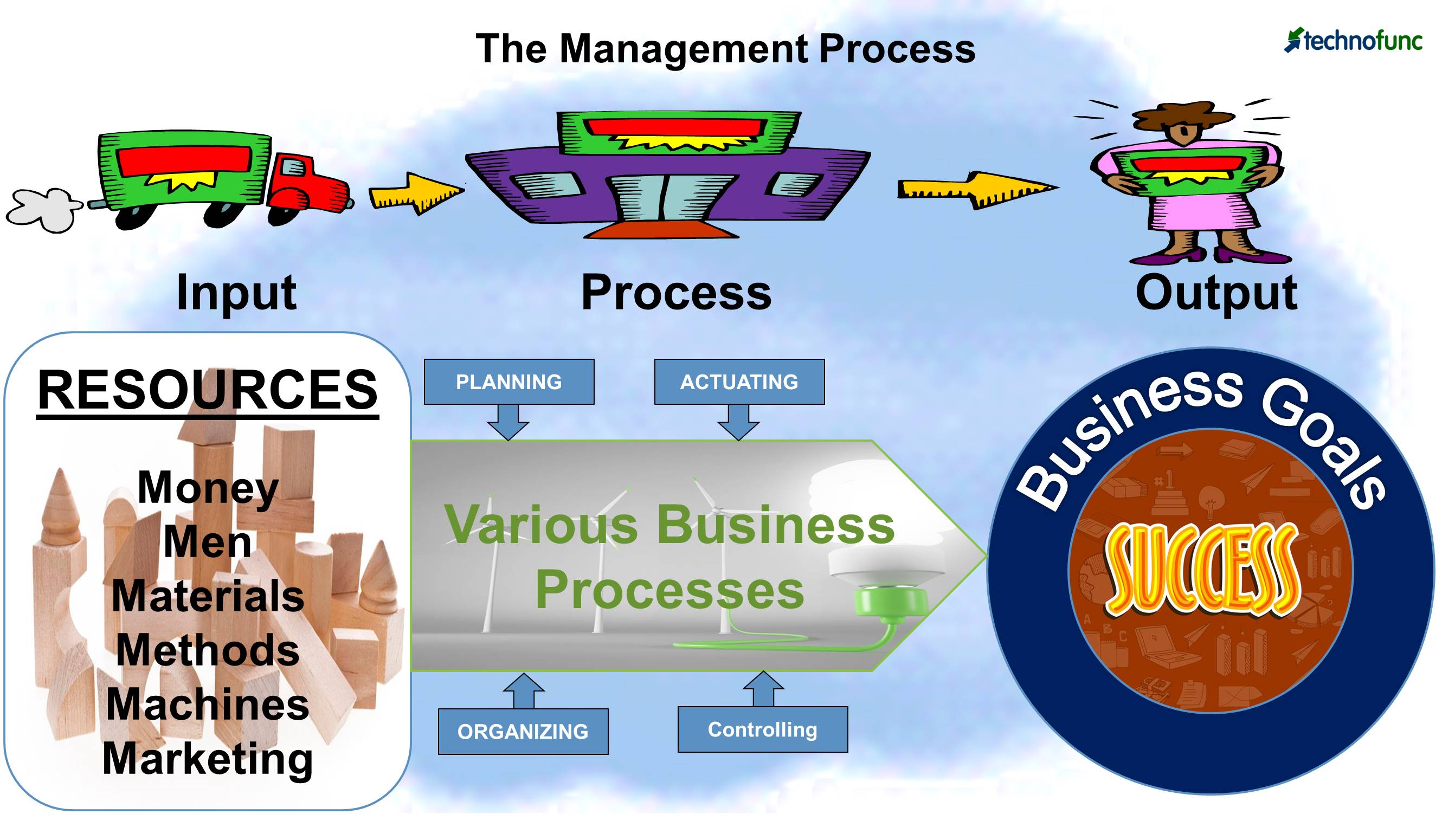- Home
- Business Processes
- Industry Knowledge
- Aerospace Industry
- Automotive Industry
- Banking Domain
- BFSI Industry
- Consumer/ FMCG Industry
- Chemicals Industry
- Engineering & Construction
- Energy Industry
- Education Domain
- Finance Domain
- Hospitality Domain
- Healthcare Industry
- Insurance Domain
- Retail Industry
- Travel and Tourism Domain
- Telecom Industry
- Leadership Skills
- eLearning
- Home
- Leadership Skills
- Leadership & Management
- Concept of Management
Concept of Management
The concept of management refers to the process of planning, organizing, staffing, directing, coordinating, and controlling to achieve organizational goals. It is the management of human, physical, financial, and other valuable resources of the organization in an effective and efficient manner to achieve business objectives.
Different people have conceived and defined management in different ways. But, the essence of management lies in determining worthwhile goals and then carefully selecting and utilizing resources through efficient and effective planning, organizing, actuating, and controlling to achieve those goals.
Who is a Manager?
You are a manager. What does this mean? The word derives from the ancient French word for handling horses and a later one for handling the affairs of the kitchen. Cynics might replace horses with donkey, but all would see the analogy of keeping an organization alive through the activities of the kitchen. Probably the one that is most simple, popular, and often quoted by many in general is "getting things done through other people."
Let us now look at different definitions that highlight important aspects of management.
- Management is a distinct process consisting of activities of planning, organizing, actuating and controlling, performed to determine and to accomplish stated objectives with the use of human beings and other resources (Martin, 1977).
- Good management is merely the exercise of common sense and the Golden Rule (Daniel, 1976)
- The six M’s (money, men, materials, methods, machines, and marketing) of management or the basic resources, as they are often called, are subjected to the fundamental functions of management - planning, organizing, actuating, and controlling -to achieve stated objectives.
- Management is an art struggling to become a science.
- Management science is a body of systematized knowledge accumulated and accepted with reference to the understanding of general truths concerning management.
- The art of management is a personal creative power plus skill in performance. The contemplation of problems, events, and possibilities develops personal creative power, while experience, observation, and study of results contribute to skilled performance. It other words, management art involves envisioning an orderly whole from chaotic parts, communicating the vision, and achieving the goal. It is the "art of arts" because it organizes and uses human talent (Boehringer, 1975)

From these definitions, we can infer that the principles and the techniques of management are not only applicable to the business world but they can be equally applied universally. They also find application in social, religious, charitable, and non-profit organizational contexts.
Essentially we can conclude that management is the integration of human and other resources in a manner that leads to effective utilization and harmonization of the individual efforts with organizational goals.
Suggested Reading and Resources
Related Links
You May Also Like
-
McClelland's Theory of Needs is a human motivation theory which states that an individual's specific needs are acquired over time through our culture and life experiences. As per the three needs theory, these acquired needs significantly influence the behavior of an individual. The three main driving motivators are the needs for achievement, affiliation, and power.
-
Tools for Developing Your Team
If a manager has too many weak spots in the talent of the team, the ability to empower the team members to independently execute the project is impaired. Assignments fall behind schedule or stretch out because the needed skills or knowledge are not in place when needed. To successfully execute important projects, hiring talented people, and increasing the talents of existing staff are most important.
-
Theory Z also called the "Japanese Management" style is a leadership theory of human motivation focused on organizational behavior, communication, and development. It assumes that employees want to enter into long term partnerships with their employers and peers. Offering stable jobs with an associated focus on the well-being of employees results in increased employee loyalty to the company.
-
Principles of management are fundamental concepts and advisory guidelines for managerial decision making. By using management principles, managers can more easily achieve the objectives and avoid making mistakes in their activities. Management principles can be applied to any kind of organization and to managers at all organizational levels.
-
Team leadership theory is a recent leadership theory that does not discriminate between the leader and the other team members. The approach considers contributions from each team member to be critical for organizational success. This approach focused on the overall team effectiveness and team problems are diagnosed and action is taken to remediate weakness. This approach provides for taking corrective action when the leader deems necessary.
-
Max Weber gave the theory of Bureaucratic Management in 1915. Bureaucracy is a specific form of organization defined by complexity, division of labor, professional management, and hierarchical management control. Weber's theory has two essential elements - organizational hierarchy and rules-based management. Weber made a distinction between authority and power and advocated that authority must be given to the most competent and qualified people.
-
Managers have to perform many roles in an organization, and how they handle various situations will depend on their style of management. Management styles are the characteristic ways, of making decisions relating to subordinates. These are the strategies, efforts, or direction used by the manager, to create an efficient workplace, to achieve organizational goals. A management style is the method of leadership used by a manager.
-
The development of teams is an ongoing process because the composition of the team may keep on changing. The new members may join and the old members may leave the team. The team members pass through several stages for the development of the team and there has been a lot of research to identify these stages. In this article, we discuss the common theories of team development.
-
Maslow's hierarchy of needs is a motivational theory that explains that people are motivated by five basic categories of human needs. These needs are physiological, safety, love and belonging, esteem, and self-actualization. There is a little scientific basis for this concept of a hierarchy of needs.
-
Investment Theory of Creativity
Sternberg in the year 2006, proposed the investment and confluence theory focused on understanding creativity. According to the investment theory, creativity requires a confluence of six distinct but interrelated resources known as intellectual abilities, knowledge, styles of thinking, personality, motivation, and environment. It emphasizes that creativity is not about one thing, but about a system of things.
Explore Our Free Training Articles or
Sign Up to Start With Our eLearning Courses

About Us
Learning
© 2023 TechnoFunc, All Rights Reserved










